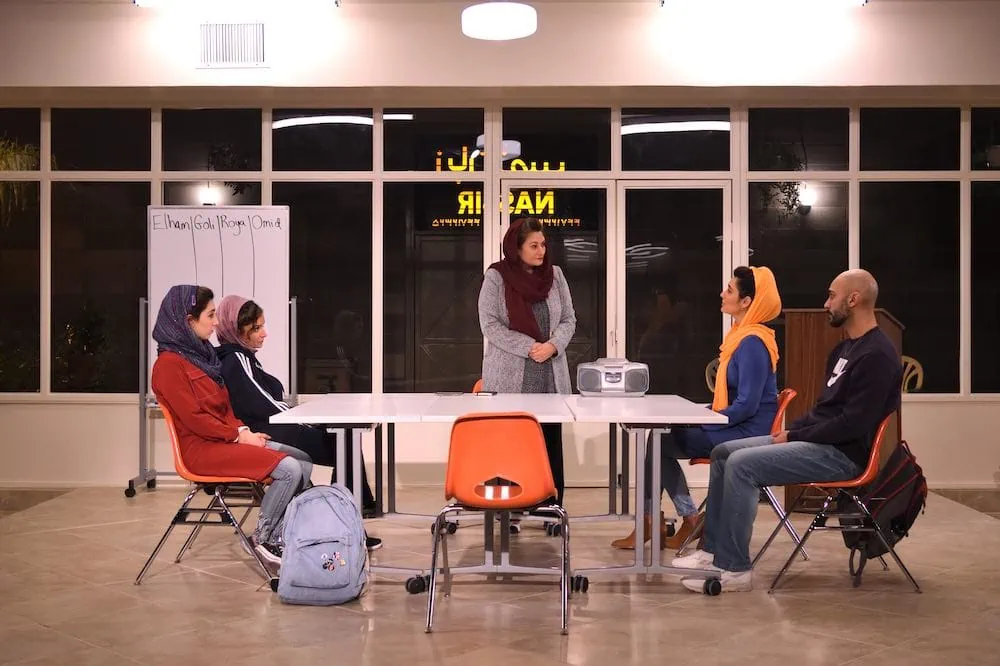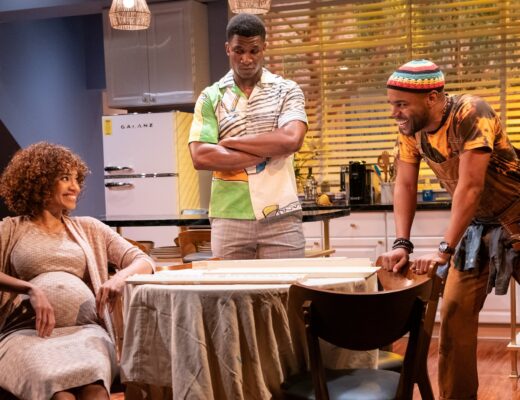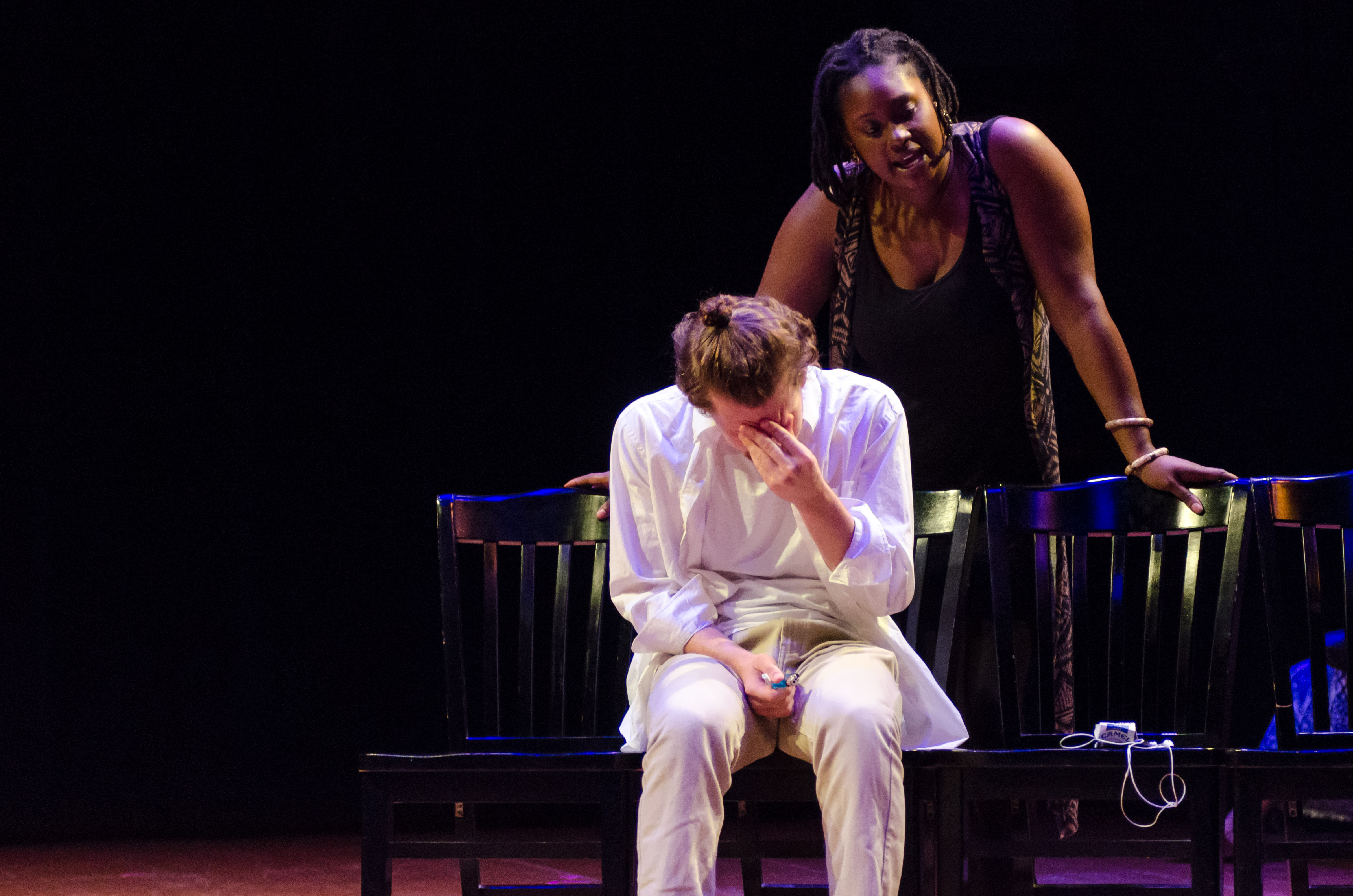by Jakob Cansler
This article was first published in DC Theater Arts here.
It is fair, I think, to assume that for the vast majority of Americans, the stakes of learning a foreign language are low. It is rarely something to lose sleep over — a necessity only insomuch as it fulfills graduation or career requirements.
For many others around the world, though, learning English is a high-stakes affair, and one that comes at a cost. The play English, now in performances at Studio Theatre, makes that cost crystal clear.
Written by in-demand playwright Sanaz Toossi and directed by Knud Adams (who also directed the original New York production last year), English centers on four students studying for the Test of English as a Foreign Language, or TOEFL, in Karaj, Iran, in 2009. Their specific reasons for taking the test vary. Elham (Tara Grammy) needs a high score to go to medical school in Australia. Roya (Nina Ameri) would like to live with her son and granddaughter in Canada. Omid (Maboud Ebrahimzadeh) says he wants a green card so he can move to the U.S. For all, learning English is the key to their next step in life.
Teaching them is Marjan (Nazanin Nour), who lived in England for nine years but has moved back to Iran. In many ways, though, she is more than a teacher for them. She is also a guide through the complexities of learning a second language, a symbol of what they aspire to be, the end result of the internal conflict they face.
That end result, it seems, does not provide much comfort. Marjan is a woman constantly conflicted, essentially spliced into two separate identities: her Farsi-speaking self and her English-speaking self. Now, in Iran, she escapes into the latter identity by teaching this course, and requires an “English Only” bubble from her students. Nour portrays this identity struggle in a subtle but compelling way — we can see in her movements how one identity bleeds into the other, how her eyes shift when her identity does.
The theme of conflicting identities is ever-present in English, and the directing and design choices emphasize this while also letting the text speak for itself. Adams’ staging retains a natural and intimate quality throughout, while Afsoon Pajoufar’s naturalistic scenic design features a line of windows that might offer a glimpse into the outside world if there weren’t a concrete wall standing in between, reinforcing the sense of the classroom as a bubble that exists distinct from the Iran outside.
Meanwhile, Dina El-Aziz’s costumes enhance the complexities and contradictions faced by the characters as they enter an English-speaking world that in many ways was forced upon them. At one point, Elham, whose multifaceted nature Grammy portrays sharply, underlines her frustration with having to learn English simply because it is the lingua franca of the Western world. As she does so, she dons an Adidas jacket, a symbol of how Western culture has already invaded so much of her life. Speaking Farsi exclusively is perhaps the one aspect that it has not.
Ameri’s passionate Roya and Ebrahimzadeh’s thoughtful Omid face similar struggles. As they both contemplate leaving Iran, they are faced with what they will lose in doing so. “Our voluntary migration from this is something we should be grieving,” Roya says of her transition to English.
Only Goli, another student played by an under-utilized Narges Kalogli, is optimistic about her English-speaking self. As fascinating as that aspect of her character is, though, it is underexplored as she serves a mainly functional role for the other characters. Still, her naivety about losing any aspect of herself in English is a grim reminder of how far Western ideals have seeped.
And yet, it is not lost on anyone, the audience included, that English is a play intended for a Western, specifically American, viewership. A constant reminder of that is served in the form of the play’s handling of language — when the characters speak English, we hear accented English; when they speak Farsi, we hear unaccented English, so what feels natural to the characters sounds natural to us.
It is a clever trick that obviously serves a functional purpose in overcoming the language barrier, but it is just as important to the effectiveness of the show. After all, we can see how the actors shift when they switch from English to “Farsi.” We can observe the internal conflict as they struggle with what comes naturally to us. We can feel the guilt as Elham explains the hard truth that so many native English speakers won’t view someone as human if they speak Farsi, if they have an accent, if they don’t speak perfect, fluent, mother-tongue English.
Indeed, it speaks volumes that a story like English won’t be heard here unless it is performed entirely in its titular language. So many people have lost a piece of themselves in order to communicate stories like this one to the English-speaking world. In that ability to do so, they may have gained something, too, as Marjan argues, but a price is paid nonetheless.
Few understand how high that price is. Studio Theatre’s English simply asks that you do.





No Comments